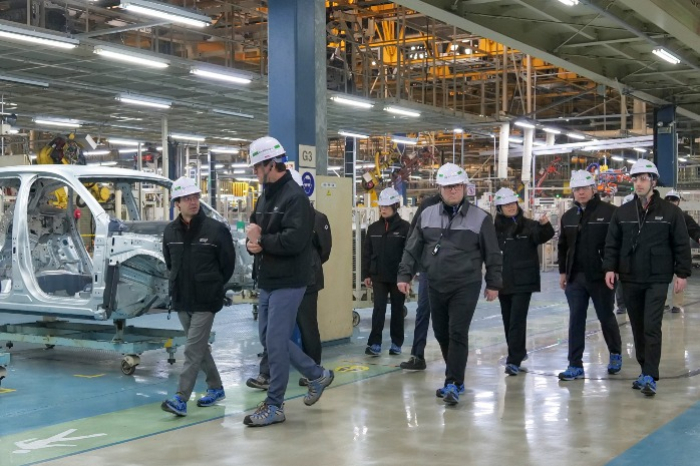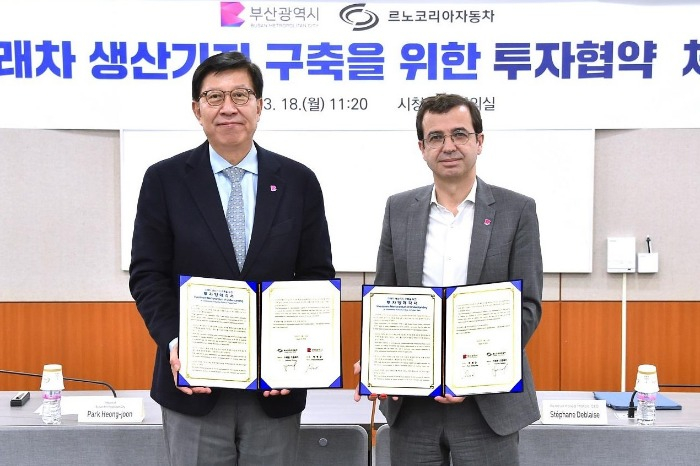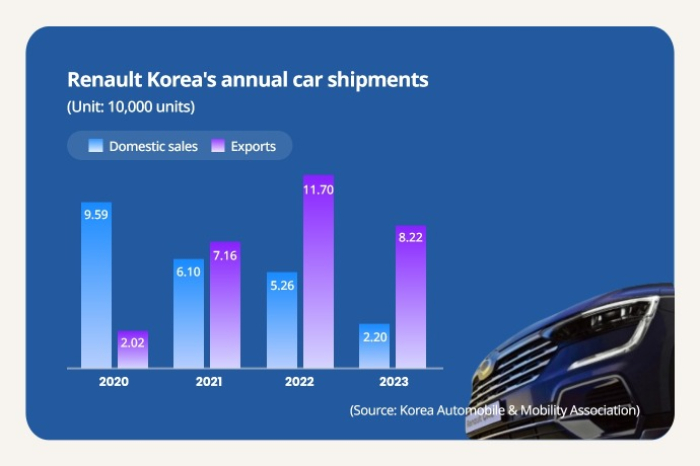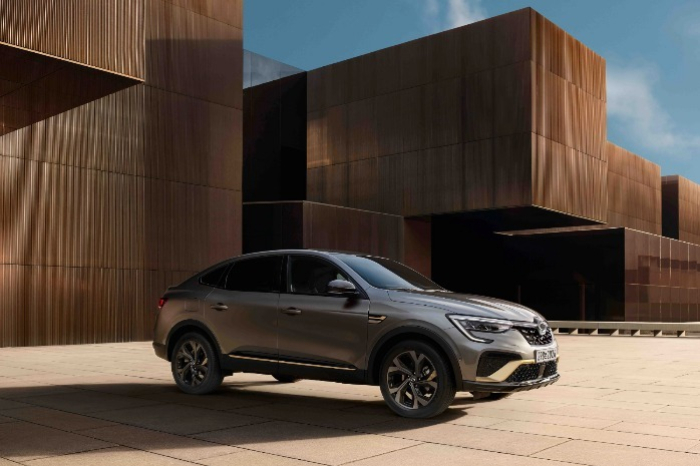Automobiles
Renault to invest $523 mn to build green car hub in Korea
The French carmaker’s Korean operation is in talks with its headquarters to more than double its total investment
By Mar 19, 2024 (Gmt+09:00)
3
Min read
Most Read
LG Chem to sell water filter business to Glenwood PE for $692 million


Kyobo Life poised to buy Japan’s SBI Group-owned savings bank


KT&G eyes overseas M&A after rejecting activist fund's offer


StockX in merger talks with Naver’s online reseller Kream


Mirae Asset to be named Korea Post’s core real estate fund operator



Renault Korea Motors Co., grappling with a protracted slump without new releases, plans to invest more than 700 billion won ($523 million) by 2027 to transform its auto plant in Busan, South Korea’s No. 1 port city, into an eco-friendly car-manufacturing hub in hopes of rejuvenating its business.
On Monday, the Korean operation of the world’s fourth-largest auto group Renault S.A. signed a memorandum of understanding with the Busan Metropolitan City government to build a future mobility center in Korea’s second-largest city.
Under the terms of the agreement, Renault will transform its Korean auto manufacturing plant in Busan into an eco-friendly car-producing base centering around hybrid and electric vehicles.
As part of the first phase of the project, dubbed Aurora 1 and 2, the French carmaker will invest 700 billion won to build its hybrid car research and development center and manufacturing facilities in the city, Renault Korea Motors’ Chief Executive Officer Stéphane Deblaise said during the signing ceremony.
Of the total investment, 118 billion won will be spent by 2027 to replace the current lines at the Busan plant with hybrid manufacturing facilities and the remaining to recruit R&D talent who will develop new hybrid models and build the related infrastructure.
Busan has agreed to provide administrative and financial aid to the French auto group.

With the project, Renault’s Korean operation aims to break out of a years-long slump after failing to roll out new models since 2020 when its last new car, the XM3, was launched.
Its total car shipments, including domestic sales in Korea and exports, plunged 40% on-year to 104,276 units in 2023.
It pins high hopes on the Aurora project, which Deblaise initiated upon his inauguration as CEO. The project’s first outcome, a mid-size hybrid sport utility vehicle under the code name Aurora 1, is slated for its release in the second half of this year.
Renault Korea will seek to export its first-ever mid-sized green car after rolling it out in the Korean market, the company’s official said.
A local auto industry official expected the latest investment to lay the groundwork for the normalization of Renault Korea’s operations.
Renault Korea CEO Deblaise also pledged to normalize the French group’s Korean business with more new cars when he took the helm of the Korean business in early 2022.

TAKEOFF AS THE GROUP’S GLOBAL EV HUB
Renault Korea is also considering more than doubling its investment to about 1.5 trillion won to produce pure electric vehicles from the Busan plant.
The Korean operation is in negotiations with its French parent to develop and manufacture next-generation electric vehicle models after completing the Aurora 1 and 2 project, said Deblaise.
The Korean operation head expected the total investment to be jacked up beyond 1.5 trillion won by 2027 if their talks succeed.
He also called for generous support from the Busan Metropolitan City government.
When they are set up, its new EV lines in Busan will be a foreign finished carmaker’s first investment in EV manufacturing facilities in Korea.

The French headquarters is reportedly taking a positive stance on the additional investment, according to sources.
Renault Group’s Vice Chairman Guido Haak last year vowed during his meeting with Busan City government officials to build a plant with an annual production capacity of 200,000 EVs in the port city with massive investments as part of the group’s efforts to speed up its migration to the future mobility technology.
He was reported to tout the Busan plant as the group’s main global manufacturing base.
After Haak's visit to Busan, the French auto group designated the Busan plant as one of its five global manufacturing hubs outside of Europe, and the Korean plant is now responsible for the development and production of mid and full-size large cars.
Its Busan plant will also start churning out Swedish electric vehicle maker Polestar’s upcoming Polestar 4 SUV coupe next year.
Write to Nan-Sae Bin at binthere@hankyung.com
Sookyung Seo edited this article.
More to Read
-
 Electric vehiclesPolestar 4 EV to be built at Renault’s Korean plant from 2025
Electric vehiclesPolestar 4 EV to be built at Renault’s Korean plant from 2025Nov 10, 2023 (Gmt+09:00)
3 Min read -
 Electric vehiclesRenault to build new EV plant at its Korean base in Busan
Electric vehiclesRenault to build new EV plant at its Korean base in BusanJun 21, 2023 (Gmt+09:00)
2 Min read -
 AutomobilesRenault Korea seeks to establish R&D center in Busan
AutomobilesRenault Korea seeks to establish R&D center in BusanMay 22, 2023 (Gmt+09:00)
1 Min read -
 AutomobilesRenault confident of Korean sales recovery; looks to larger cars
AutomobilesRenault confident of Korean sales recovery; looks to larger carsJun 13, 2022 (Gmt+09:00)
3 Min read
Comment 0
LOG IN


